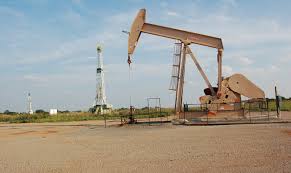
Oklahoma regulators have yet to respond to one oil group’s request to consider action to help oil and gas producers, but in Texas, the Railroad Commission plans an April 14 emergency meeting to discuss curbing oil production.
The meeting will specifically discuss a complaint from Pioneer Natural Resources and Parsley Energy “to determine reasonable market demand for oil in the state of Texas,” according to the notice. A RRC official said the discussion will include whether to have drilling companies in the state ration production.
Pioneer Natural Resources and Parsley Energy, major players in the state’s sprawling Permian Basin oilfield, had asked the commission for the hearing to address what the firms called an “extraordinary, unforeseeable crisis” brought on by the coronavirus pandemic and a Saudi-Russian oil price war. The confluence of economic disruptions has pushed prices to lows not seen since around the turn of the century.
With global oil demand in the tank from the pandemic and U.S. producers already running out of room to store their oil, Pioneer and Parsley have pushed regulators to enact statewide production cuts that the companies argue would stave off further damage to the industry.
“Large-scale production interruptions appear inevitable and imminent,” the companies wrote to the regulators. “Without commission action, operators will shut-in wells in an ad hoc and haphazard manner that will heighten industry disruption and cause economic waste.”
Still, at least one regulator on the three-member commission has appeared open to the idea of limiting oil production.
Outgoing commissioner Ryan Sitton, a Republican who was defeated by primary challenger Jim Wright in March, has raised concerns about the global oversupply of oil and advocated for a hearing on the production cuts idea as soon as possible. But Sitton has also suggested Texas should not act alone.
“Need global cooperation to make limits meaningful,” Sitton said on Twitter this week.
Wayne Christian, another member of the commission, has expressed concern about the idea of forcibly limiting production, known as “prorationing” in regulatory jargon.
“I have many reservations about prorationing crude oil production in Texas, particularly without enforceable commitments from other states and nations to limit their production by a similar amount,” Christian wrote in an op-ed for an industry trade magazine late last month.
The influential trade group Texas Oil and Gas Association opposes the idea, saying it would “disadvantage Texas, its producers, mineral owners and taxing entities.”

In Oklahoma, the Corporation Commission was recently encouraged by the Oklahoma Energy Producers Alliance to “exercise its authority” to prevent what the Alliance called the “waste” of Oklahoma’s oil during the price collapse. The group did not specify a request to mandate a cut in oil production.
“Oklahoma oil is now selling below $20 per daily barrel, which is a price well below its “actual value” and the Oklahoma Corporation Commission should take action,” said OEPA Chairman Dewey Bartlett, Jr. in a letter to the three commissioners.
While the letter cited historical evidence of the commission using its powers in 1914 to restrict oil drilling and production in the Cushing and Healdton fields, it never asked for any mandated reduction in 2020 but made strong suggestions for such action.
“We are not suggesting that the Commission shut down all oil production in Oklahoma, although that is certainly within their power to do so. There are many actions they can take under that authority that would have a positive effect on a chaotic market,” said OEPA President and Ardmore oil and gas producer David Little.
However, the commission in early March took action to reduce gas flow from natural gas wells in the state, a split decision that was made despite opposition from some of Oklahoma’s largest oil and gas companies and the American Petroleum Institute.
While Commissioners Todd Hiett and Dana Murphy, who proposed the mandated reduction, voted for the move, Commissioner Bob Anthony opposed it. He later explained he opposed the forced reduction in gas production supporting instead the free market.
The regulators okayed a proration formula between April 1 and Sept. 30 that requires operators to limit an unallocated gas well’s absolute open flow to 50%. The limit also would create a cap of maximum allowable production at 2 million cubic feet a day.
Historically, the proration formula required operators to limit a well’s open flow at 65% or 2 million cubic feet per day. But Commissioner Dana Murphy urged a requirement of 50% based on data from the state’s 174 most capable gas wells in 2019.
Murphy’s proposal was opposed by major companies such as Devon Energy, Gulfport Energy, Marathon Oil, Cimarex and Ovintiv.
One major, Continental Resources supported Murphy.
“We feel this change is necessary to maintain proper market balance of the state’s natural gas production,” argued the company in a letter to the commission.
As for the OPEA’s request, it was a letter and not an actual case to be decided by the Corporation Commission.
OK Energy Today reached out to each of the commissioners. Commission chairman Todd Hiett responded with an email.
“I have received the letter you referenced. There have been no cases filed regarding this issue, but would not want to comment at this time not knowing if cases requiring action may develop.”






